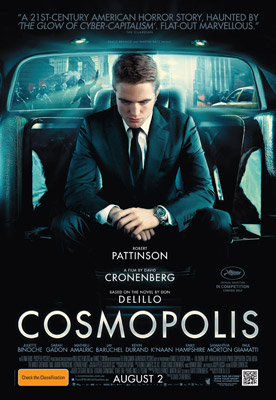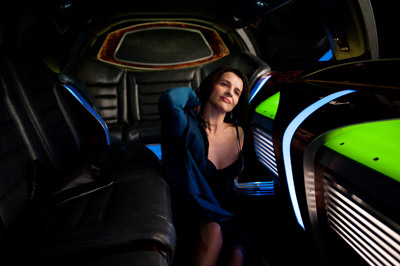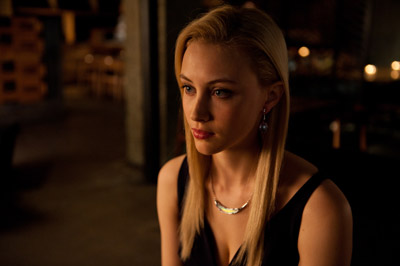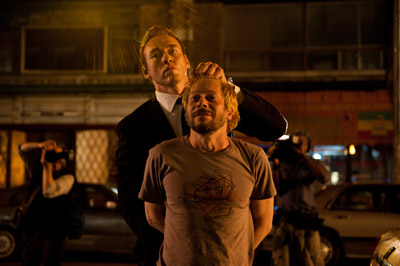David Cronenberg Cosmopolis Interview

David Cronenberg Cosmopolis Interview
Cast: Robert PattinsonDirector: David Cronenberg
Genre: Drama
Running Time: 108 minutes
Synopsis: New York City, not-too-distant-future: Eric Packer, a 28 year-old finance golden boy dreaming of living in a civilisation ahead of this one, watches a dark shadow cast over the firmament of the Wall Street galaxy, of which he is the uncontested king. As he is chauffeured across midtown Manhattan to get a haircut at his father's old barber, his anxious eyes are glued to the yuan's exchange rate: it is mounting against all expectations, destroying Eric's bet against it. Eric Packer is losing his empire with every tick of the clock.
Meanwhile, an eruption of wild activity unfolds in the city's streets. Petrified as the threats of the real world infringe upon his cloud of virtual convictions, his paranoia intensifies during the course of his 24-hour cross-town odyssey. Packer starts to piece together clues that lead him to a most terrifying secret: his imminent assassination.
Release Date: August 2nd, 2012
For more interviews see:
Robert Pattinson Cosmopolis Interview
Don DeLillo Cosmopolis Interview
Interview with David Cronenberg
Question: Did you know Don DeLillo's novel?David Cronenberg: No, I hadn't read it. Paulo Branco and his son Juan Paulo came to suggest that I adapt it for the screen, Paulo told me: "My son thinks you are the one who should make the film". I knew other books by Don DeLillo, and I knew Paulo and the many great films he has produced, so I thought: it's worth taking a look. This is quite unusual for me, since I generally prefer to come out with my own projects. But because of these two, I said OK and took the book. Two days later, I had read it and I called Paulo to say: "All right, I'm in".
Question: You wanted to write the screenplay yourself?
David Cronenberg: Definitely. And you know what? I did it in six days. That's unprecedented. In fact, I started typing down all the dialogues from the book on my computer, without changing or adding anything. It took me 3 days. When I was done, I wondered: "Is there enough material for a film? I think so". I spent the next three days filling up the gaps between dialogues and just like that, I had a script. I sent it to Paulo, who first said: "You're rushing it". But in the end he liked the script and off we went.
Question: What convinced you that the novel could be turned into a film, and that you wanted to direct it?
David Cronenberg: The amazing dialogues. Don DeLillo is famous for it, but the dialogues in Cosmopolis are especially brilliant. Some dialogues are said to be "Pinteresque", a la Harold Pinter, but I think we should also talk about "DeLillesque" dialogues. Except Pinter is a playwright, his virtuosity as a dialogist is more obvious, but as far as novels are concerns, Don DeLillo's work clearly shows exceptional expressive power.
Question: What convinced you that the novel could be turned into a film, and that you wanted to direct it?
David Cronenberg: The amazing dialogues. Don DeLillo is famous for it, but the dialogues in Cosmopolis are especially brilliant. Some dialogues are said to be "Pinteresque", a la Harold Pinter, but I think we should also talk about "DeLillesque" dialogues. Except Pinter is a playwright, his virtuosity as a dialogist is more obvious, but as far as novels are concerns, Don's work clearly shows exceptional expressive power.
 Question: What was your take on Don DeLillo's world?
Question: What was your take on Don DeLillo's world?David Cronenberg: I had read several of his books, Libra, Underworld, Running Dog… I really like his work, even if it's all-American. I am not American, I am Canadian. It is really different. Americans and Europeans think of Canadians as better behaved and slightly more sophisticated versions of Americans, but it is far more complicated than that. In Canada, we didn't have a revolution, slavery, or a civil war, here only the police and the army carry guns, we don't share such civilian armed violence at all, and we have a deep sense of community, and of the necessity to provide everyone with a minimum income. Americans regard us as a socialist country! It is somewhat different with Don DeLillo's books, because I can grasp his vision of America, he makes it understandable and I can relate to it.
Question: Both the novel and the film take place in New York, but in slightly different ways. The book gives meticulous geographical details, while the film is more abstract.
David Cronenberg: In the novel, Eric Packer's limousine crosses Manhattan from East to West along 47th Street. Many places described in the book don't exist anymore, this New York has become partly imaginary. To me, even if the book is unquestionably set in New York, it is a very subjective New York, we are actually in Eric Packer's mind. His version of the city is mostly cut off from the realities of the street, he doesn't really understand the people or the city itself. Therefore I thought it was legitimate to settle for a more abstract vision, even though it is really New York that you can see unfolding behind the car's windows.
Question: A decade has passed between the writing of the novel and the making of the film. Did you think of it as a problem?
David Cronenberg: I didn't, because the novel is surprisingly prophetic. And while we were making the film, things happened that were described in the novel, Rupert Murdoch received a pie in the face, and of course there has been the "Occupy Wall Street" movement, after we finished shooting. I had to change very few things to make the story contemporary, the only difference is we used the Yuan instead of the Yen. I don't know if Don DeLillo has stock accounts but he should: he has a remarkably perceptive vision of what is going on and how things are going to turn out… The film is contemporary, while the book was prophetic
 Question: You read a book differently when you know that you might turn it into a film.
Question: You read a book differently when you know that you might turn it into a film.David Cronenberg: Yes indeed. It had never happened to me, I don't read books thinking: Could this make a film? It is not what I usually look for, I just read a lot because I enjoy it. It would spoil the fun. But this time, I found myself making two things at once, reading both as the reader of a good novel and as a director wondering if there is enough material for a film. Of course, afterwards, once there is an adaptation, you get a fusion between the sensibility of two authors, in this case Don DeLillo and myself. It was the same thing with Ballard or Stephen King. It is like making a child, you need two people, and the film turns out looking a little bit like both of its "parents", or it is like Marxist dialectics. Indeed I couldn't but think a little about Marx while making the film, if only because you can hear the first sentence from the Communist Manifesto in it, "a spectre is haunting the world"…
Question: Only now it's not Europe, it's the world you're talking about…
David Cronenberg: Sure. But here is an important topic, one that I had never really tackled before: money. The power of money, the way it shapes the world. In order to deal with it, I didn't need to make thorough research into the world of finance. Its agents are everywhere to be seen. They are on television, in documentaries, in the papers. They do and say what Don DeLillo wrote, their behavioural patterns are just like Eric Packer's. To me, the reference to Marx isn't trivial. In the Communist Manifesto, Marx writes about modernism, about the time when capitalism will have reached such a degree of expansion that society will go too fast for the people, and when the impermanent and the unpredictable will rule. In 1848! And this is exactly what you get to see in the film. I often wondered what Karl Marx would have thought about the film, because it shows a lot of things he had foreseen.
Question: What do you mean by "filling up the gaps" between dialogues?
David Cronenberg: After three days, my dialogues were "in limbo", I had to figure out how to make them happen in the limousine. Therefore I had to describe the limo in detail: where does Eric sit? Where are the others? What is happening in the streets? In what kind of setting does the cream pie attack occur? And so on. It is mostly practical stuff, like choosing settings and props, but it does shape the film. I have never written a screenplay for another director, so when I write, I always have the directing in my mind. To me, a script is also a plan for my crew and the actors, and a production tool too. You have to think of all that at once, what kind of information will the set designer, the prop designer or the costume designer need? What are the financial consequences of such and such option? Etc.
 Question: Among the changes you made, there is that scene at the end of the book when Eric Packer finds himself on a film set…
Question: Among the changes you made, there is that scene at the end of the book when Eric Packer finds himself on a film set…David Cronenberg: Yes, I soon as I read it, I thought: it's not really happening, it is only in Packer's mind. I don't believe it. And I couldn't see myself filming dozens of naked bodies in a street of New York. I am wary of films within films. It can be interesting, but only when it's called for. It is one of the main cuts I made from the book, together with the bags lady, the homeless woman they find in the car when coming back from the rave party. I shot the scene, but afterwards I thought the situation was unlikely, artificial, so I edited it out.
Question: And of course you also cut the chapters in which Benno Levin intervenes within the story, before the final meeting.
David Cronenberg: It wouldn't have worked in the film. We would have needed a voice-over or one of these devices which often generate poor results. I preferred to save it all for the meeting between Packer and him, the final sequence, which is very long: 20 minutes. 20 minutes of dialogues! It is a choice, the kind of choices you have to make to turn a novel into a film. Then again, when a script is over, I still don't know what kind of film I am going to make. I am often asked if the outcome is up to my expectations, but I have no expectations to begin with. It would be absurd to devise a kind of blueprint or an ideal, and to try and match it as closely as possible. Only the countless steps in the making of a film can make it what it is in the end. And it's all for the best. This is why I don't make storyboards: everybody just tries to recreate what was drawn. That is not my idea of cinema. I need to be surprised, by myself and by the others. Starting with the actors, of course. But even with Peter Suschitzky, the cinematographer I have been working with since 1987, we are always trying out new things and trying to surprise each other. It's more fun that way.
Question: How did you choose the settings?
David Cronenberg: Strangely enough, 47th street in New York looks quite like some streets in Toronto. We created the space of the film by putting together genuine elements from New York with others from Toronto, where we were filming the interior shots. We couldn't shoot the whole film inside a real limo, we had to recreate some scenes in the studio so that we could move the camera around. Therefore, what you see in the foreground behind the car's windows are mostly rear projections. The main thing is the limo itself, which is not so much a car as a mental space: being inside the limo is being inside Eric Packer's head. This is what matters.
Question: Inside the "prousted" limo. The word doesn't appear in the French translation…
David Cronenberg: Really? It is in the novel, though, it is a neologism made up by DeLillo as a reference to Proust, who had his room cork-lined. DeLillo invented the verb "to proust". I'm not sure many people will understand the allusion, but I didn't want to explain it, anyway I think the word generates some questioning, a distortion. It's just as well. We did some hard thinking about the inner fittings of the car, which looks just like any other limo from the outside. The kind of throne on which Packer sits isn't really plausible, but it epitomizes the balance of power, the predetermined relationship between the master of the place and his guests. Many fittings come from the book, including the marble floor.
Question: In the book, there are screens on which he sees himself in the future… just like he sees his own death in the glass of his watch at the end. You didn't keep this element.
David Cronenberg: I tried to, we shot scenes in which he sees himself a little bit further in time. But it looked fake, to me it was just a trick. I thought that you either make a big deal of it, underlining it more, or you just drop the whole thing. If Eric Packer sees the future, it becomes a main feature of the character, and somehow I have already tackled this issue in Dead Zone. We kept only one sentence from this whole idea of anticipation, "Why do I see things that haven't happened yet?", because it has to do with the fact that he is a billionaire.
Question: How was the casting process?
David Cronenberg: Interestingly, as was already the case for A Dangerous Method, the actors weren't those I had in mind to begin with. Both times, it was part of the permanent reinvention of the film. For Cosmopolis, at first Colin Farrell was to play the main part, and Marion Cotillard was to play Elise, Eric Packer's wife. Then, Farrell had a conflicting schedule and Marion Cotillard was pregnant. So I changed the script, adjusting it to a younger actor, which is more faithful to the book, and of course his wife also had to be younger. It's much better this way. The real problem is when you have made funding arrangement based on the name of an actor and he walks away - it's not an artistic problem, it's a money problem. But this wasn't really an issue for us
Question: Did you think of Robert Pattinson right away?
David Cronenberg: Yes. His work in Twilight is interesting, although of course it falls within a particular framework. I also watched Little Ashes and Remember Me, and I was convinced he could become Eric Packer. It is a heavy part, he appears on each and every shot, and I don't think I have ever made a film on which the same actor literally never leaves the frame. The choice of an actor is a matter of intuition, there are no rules or instructions about it.
Question: For this film, you've teamed up again with most of the people you usually work with, like Peter Suschitzky, or composer Howard Shore, who has written music for all your films, starting with The Brood, thirty-three years ago. Did you have any special requirements for the music this time?
David Cronenberg: Howard Shore was one of the first persons I sent the script to. It had two characteristics. First, it featured music, like songs from Sufi rapper Brutha Fez, or Erik Satie. Also, there was a huge amount of dialogues, which is quite challenging for the score, especially when dialogues are subtle and you just cannot put trumpets all over them. We needed a music that was discreet but still capable of establishing certain tones. Howard worked with Canadian band Metric, singer Emily Haines uses her voice like an instrument, in a subtle way that perfectly met our needs.
Question: You insisted that your actors should say their lines exactly as they were written…
David Cronenberg: Yes I did. You can make a film in a way that allows the actors to improvise, great directors have successfully done it, but I have a different perspective. I don't think it is the actors' job to write dialogues. Especially for this film, since the dialogues, by Don DeLillo himself, was the reason why I wanted to make it in the first place. That being said, the actors still had broad leeway, tone and rhythm were entirely up to them. It was particularly interesting for Robert Pattinson, on whose limo various characters turn up, played by very different actors. It brought him to act differently depending on which actor was opposite him.
Question: Did you try to shoot the film chronologically?
David Cronenberg: As much as possible. It was the case for almost all the scenes within the limo. Paul Giamatti came at the end, and the last scene we shot is the final scene in the film. Sometimes there were practical impediments, but for the most part, I managed to respect chronology better than on my previous films. Given that the story unfolds in a single day, but following a complex evolution, it was especially beneficial to work that way.
MORE
- Emma Stone Magic in the Moonlight
- Jessica De Gouw Cut Snake
- Maxine Peake Funny Cow
- Denzel The Equalizer 2
- Johnny Flynn Beast
- Logan Marshall Green Upgrade
- Shailene Woodley Adrift
- Eric Toledano and Olivier Nakache C'est La Vie...
- André Leon Talley The Gospel According To André...
- Shakespeare In Tokyo
- Mission: Impossible Fallout
- Glenn Close The Wife
- Allison Chhorn Stanley's Mouth Interview
- Benicio Del Toro Sicario: Day of the Soldado
- Dame Judi Dench Tea With The Dames
- Sandra Bullock Ocean's 8
- Chris Pratt Jurassic World: Fallen Kingdom
- Claudia Sangiorgi Dalimore and Michelle Grace...
- Rachel McAdams Disobedience Interview
- Sebastián Lelio and Alessandro Nivola...
- Perri Cummings Trench Interview



